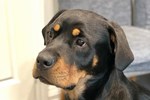Search - Research
151 - 160 of 542 results
-
Published papers
Research in relation to brachycephalic health issues from the RVC's interdisciplinary research team -
Dinosaur Dissection
Professor John Hutchinson, of the Structure and Motion Laboratory, is featured as a principal scientific consultant on a new documentary for the National Geographic Channel "T. rex Autopsy". The show is the first of its kind and features the 12 … -
New research finds Rottweilers at greatest risk of cranial cruciate ligament rupture
A new study from the Royal Veterinary College (RVC) explores the reasons for cranial cruciate ligament (CCL) rupture in dogs in the UK, as well as the factors influencing how it is managed clinically. The research also identifies which breeds are … -
New research confirms extreme welfare issues in Shar Pei, the sandpaper skin dog breed
New research from the Royal Veterinary College (RVC) has found that in-turned eyelids and ear disorders are the most common health conditions in Shar Pei dogs in the UK; both resulting from the breed’s characteristic loose, thickened and folded skin. … -
New research reveals biggest risk factors for puppies developing separation-related behaviours
New research conducted by the Royal Veterinary College (RVC), in collaboration with Dogs Trust, has identified experiences in a puppy’s early life that put them at the greatest risk of developing separation-related behaviours (SRBs) when left home …New research conducted by the Royal Veterinary College (RVC), in collaboration with Dogs Trust, has …
-
New Petplan award to Dr David Connolly, Professor Brian Catchpole, Dr Jay Dudhia (RVC) and Hannah Hodgkiss-Geere (Liverpool Vet School)
Dr David Connolly, Professor Brian Catchpole, Dr Jay Dudhia (RVC) and Hannah Hodgkiss-Geere (Liverpool Vet School) has been awarded a grant by Petplan Charitable Trust for a project called: "Avoid rejection to fix a broken heart: assessing the …Dr David Connolly, Professor Brian Catchpole, Dr Jay Dudhia (RVC) and Hannah Hodgkiss-Geere ( …
-
Red setters, bulldogs and boxers among dog breeds most likely to have a wee problem
RVC's VetCompass™ programme studied data from veterinary practices across England and found that one in every 100 male dogs is affected by urinary incontinence. -
New study shows resistance to most clinically relevant antimicrobials is increasing in major canine skin pathogen
Researchers from the Queen Mother Hospital for Animals studying Staphylococcus pseudintermedius, the predominant dog skin pathogen, showed for the first time that resistance is increasing to the most clinically relevant antimicrobials.Results from a …Researchers from the Queen Mother Hospital for Animals studying Staphylococcus pseudintermedius, …
-
VetCompass at SVEPM Conference, Ghent 2015
More than 200 delegates recently attended the 2015 Annual Conference of the Society for Veterinary Epidemiology and Preventive Medicine (SVEPM) in Ghent, Belgium. Experts and researchers from across the world contributed to workshops, oral and … -
Canine Dystocia: Prevalence and Risk Factors
Newly published article - Canine dystocia in 50 UK first-opinion emergency-care veterinary practices: prevalence and risk factors. Canine dystocia is a common presentation in emergency-care veterinary practice. The objectives of this study were to …








